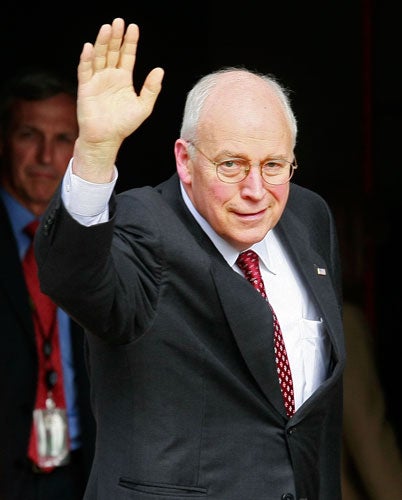Transition of power will be smooth, says Cheney

When Dick Cheney hands over to his successor, Joe Biden, the new administration is expected to strip away the vast powers the US Vice-Presidency has accumulated in the past eight years. But Mr Cheney's legacy of operating in the shadows, which has so damaged Washington's reputation abroad, may be more difficult to undo.
He was the unseen hand behind what his critics regard as the Bush presidency's greatest calamities, from starting the war in Iraq to promoting "cruel and inhuman methods of interrogation" of detainees at Guantanamo Bay. Human rights organisations accuse him of war crimes for clearing the way for the CIA to use torture techniques banned under international law.
The outgoing administration has left an "immense" weight of expectations on Barrack Obama to restore the reputation of the US around the world, Tony Blair said yesterday. Mr Obama is "somebody who has a genuine vision of how America can play a healing role in the world and has also some real sensitivity to the fact that people want America to do that," said the former prime minister who is now the UN's Middle-East envoy.
But the consequences of the Bush-Cheney administration, which Mr Blair co-operated with so closely, will not be easy to untangle. Mr Cheney also seems confident that much of his handiwork will remain intact, and that even Mr Obama's commitment to shutting down Guantanamo will be difficult to achieve. More than 250 prisoners are held there, in most cases without trial or charges being brought and often after enduring torture. Some are avowed terrorists, but many are unwitting victims of security sweeps.
As he prepares to leave office, Mr Cheney is unhappy about a policy towards Iran over its nuclear-weapons programme that he considers to be appeasement. He has long been gunning for military strikes against Tehran to prevent the regime from becoming a nuclear power. Until his successor has taken over, his opponents fear his capacity to engineer a military confrontation.
Time has probably run out for him to tie the incoming president-elect into a conflict with Iran. But not until the master of Washington intrigue has handed over the keys to his Naval Observatory residence, adjacent to the British embassy, will his opponents rest easy. Speaking at the weekend, Mr Cheney warned that "in the struggle at hand, the stakes remain high". But he said he was confident that "those who hate America are no match for those who love America".
As soon as Mr Bush took over in 2000, Mr Cheney insisted that all the emails of high-level officials be secretly rerouted to his private office, thereby turning himself into a sinister, if invisible, political power. He intervened in decisions long before they arrived on the President's desk and specialised in "reaching down" to officials, unnerving them with personal phone calls to demand action.
Mr Cheney's behind-the-scenes role in guiding policies which compromised civil liberties in the name of fighting terrorism continues. Only last month, new guidelines were rushed through for the FBI that permit agents to use intrusive techniques to collect information on Americans even where there is no evidence of wrongdoing.
Subscribe to Independent Premium to bookmark this article
Want to bookmark your favourite articles and stories to read or reference later? Start your Independent Premium subscription today.

Join our commenting forum
Join thought-provoking conversations, follow other Independent readers and see their replies